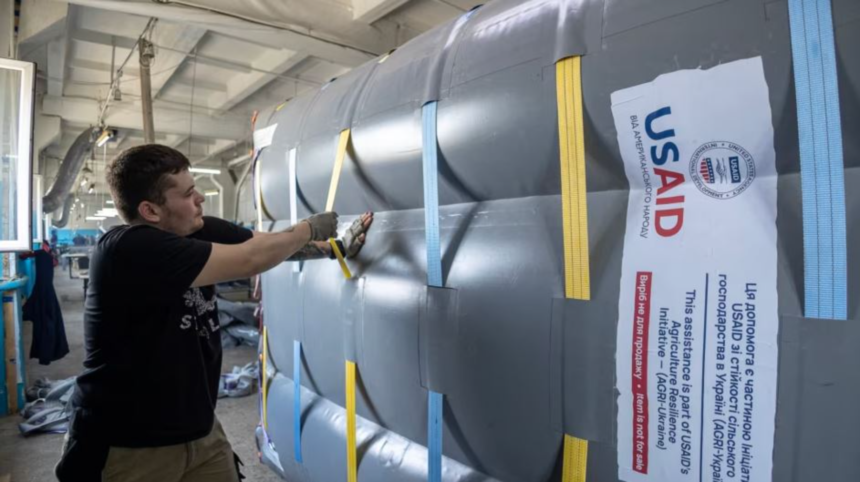A charitable organization in Ukraine, which has worked with war veterans and their families, announced that it will suspend its operations due to its dependency on funds from the U.S. Agency for International Development (USAID).
And it is not the only one. Across the country, businesses and non-governmental groups are facing major difficulties as their budgets have been significantly reduced.
“I am doing everything I can to keep the team,” said Natalia Parkhitko, acting director of the Dostupno charity organization.
“The news was shocking.”
U.S. President Donald Trump halted USAID’s operations when he ordered a 90-day freeze on its spending, starting from January 24.
On February 3, employees were denied access to offices in Washington, and staff members are being withdrawn from foreign countries.
Contractors have been laid off or put on mandatory leave, which has prompted thousands of people to join protests in Washington.
USAID is the U.S. government’s main agency for managing civilian aid and development assistance worldwide. The organization has been present in over 100 countries, distributing billions of dollars annually, with more than 10,000 employees around the globe.
The Trump administration has criticized USAID’s programs as inefficient and not aligned with American interests, arguing that some of the agency’s functions would be managed by the U.S. Department of State. Even critics have acknowledged that some social and cultural programs funded by USAID were not in line with the agency’s initial mission.
Dostupno has worked for years on issues related to the accessibility of public spaces for people with disabilities.
This category of society has only grown since Russia’s war in Ukraine began in 2022.
Among the organization’s activities is providing help to injured soldiers to return to daily life through psychological support and other benefits for people with special needs.
Parkhitko said the group is looking for alternatives and hopes to generate additional funds through public appeals.
“We can’t even think that Dostupno will close all its projects and stop working. Despite the freeze on funds, we will continue our activities,” she said.
Currently, Dostupno is unable to pay staff salaries.
Since 2022, USAID has allocated billions of dollars to Ukraine, providing humanitarian aid, development assistance, and direct support for the state’s budget. The agriculture sector has benefited the most in Ukraine.
USAID has stated that since 2022, it has helped one-third of Ukrainian farmers, providing them with seeds, fertilizers, pesticides, and funding for their requests.
One of the recipients of aid is the All-Ukrainian Agrarian Council, a non-governmental organization that supports farmers and advocates for agricultural reforms.
Its leader, Andriy Dykun, told REL that USAID’s support is vital for small and medium-sized organizations involved in agriculture in occupied or recently liberated regions, helping them return to farming.
“For example, grain storage bags, fertilizers, seeds. With USAID’s support, agricultural land reforms have begun, and now we are helping farmers to create associations for water use,” he said.
“Grants, advisory services, and legal support – all of these have significantly helped Ukrainian farmers,” Dykun added.
This situation is also affecting the Ukrainian government, as its budget has been impacted in ministries such as Energy, Health, Education, local municipalities, and other state agencies.
Ukrainian deputy Inna Sovsun said that in September of last year, USAID allocated $325 million to help the energy sector, which has been repeatedly hit by Russian bombings.
“We won’t comment for now until we study all the details. Perhaps USAID can provide more information,” the Ministry of Energy said in written responses to REL.
“USAID’s aid has completely changed the situation, impacting the lives of hundreds of thousands of Ukrainians, and has set new standards for the sluggish state machinery,” said Vladyslav Sodel, a photographer who has documented USAID’s work for eight years.
He said he was very surprised when he realized the variety of projects funded by the agency.
“Starting from a bed with a mattress, then shelters for refugees, to injections worth billions of dollars for the stability of our energy networks.”







